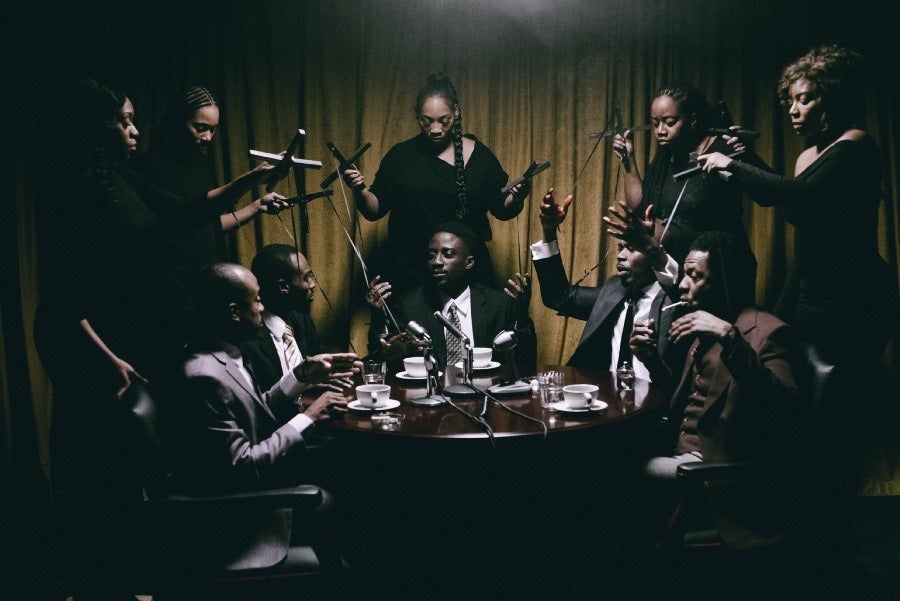Terence Nance, creator of HBO’s “Random Acts Of Flyness,” explores black experiences in America. Plus, scientist Emma Byrne says voicing vulgarity could be good for you and “Boom Town” author Sam Anderson thunders on about the secret allure of Oklahoma City.
Featured in this Show
-
'Random Acts Of Flyness' Offers Surreal Exploration Of African-American Life In Modern America
Terence Nance is the creator of the HBO series, “Random Acts of Flyness,” which explores the African-American experience in contemporary America through a fluid, stream-of-consciousness approach that combines such elements as verite documentary, musical performances, surrealist melodrama and animation.
Nance and his collaborators examine a variety of themes, including ancestral trauma, death, and the singularity.
How does Nance describe “Random Acts of Flyness?”
“I think that the title is the best description of the show,” he told WPR’s “BETA.” “It is hard for me to even find accurate descriptors for it so usually if I’m asked to do that, I just ask what whoever’s asking me likes on television. And then I kind of find a way to lean it toward that, whatever they decided they liked. Because I think that there are a lot of things happening so often I can find a way to make it relatable to anything that that person might like.”
How would Nance compare “Random Acts of Flyness” to Justin Simien’s hit Netflix series, “Dear White People”?
“We (Justin and I) come from the same culture and community so I think that a lot of just the underlying conversations that inspire the show are similar if not the same. And I think where there’s a big point of commonality is I think that we both have an experience of being in our 20s and 30s in America at a time in internet culture, (and) we both know what it’s like to not have a phone, like walk around for a summer and not have a phone,” Nance said.
“And then also know what it’s like to kind of be digital natives as black people, male embodied black people. And I think that a lot of what’s common about the shows is that we’re navigating, expressing ourselves at that kind of border, we’re in that border town of generations.”
One reviewer wrote that probably the best category for the six-episode first season is “Afro-surrealism,” the literary and cultural aesthetic that is an effort to reflect African-Americans’ lived experience.
Does Nance see “Random Acts of Flyness” as Afro-surrealism?
“Oh yeah, definitely. I think that there’s a healthy dose of abstraction and surrealism at play in the show,” Nance said. “I don’t think that aspect of the show is necessarily what makes it hyper-different than all the other shows. In “Dear White People,” there’s characters talking to dogs. In “Atlanta,” there’s an invisible car and light comes out of chicken boxes. And Izza Rae talks to herself in the mirror (in “Insecure”).
“So I think there’s a shared aesthetic rendering of our experience that I think other people experience as surreal but I think for us is actually naturalism in a way,” Nance continued. “I think that when we’re dealing with expressing our experience, it’s more natural for us to use imagery and sounds that engage the metaphysical, I think, at the end of the day. Because I think a metaphysical experience of the world is natural for us, for our generation of black people for sure.”
One of the most powerful segments in the first episode of “Random Acts of Flyness” is “Everybody Dies” a parody of a public access children’s show hosted by “Ripa the Reaper.”
“When she (Frances Bodomo) was making it and talking about it, I definitely identified with all of the emotions that were at play. But specifically just the absurdity that just all humans would experience, but definitely black people experience, when confronted with so many images of the state murdering children, black children. And I think that the absurdity that kind of comes after the anger and sadness gets centralized in a way that I hadn’t experienced before,” Nance said. “Because I think the absurdity of the layers of emotion like you can’t process any more sadness so maybe it will become funny for at least a moment. And then you can’t process the humor so maybe then it will become rage or defiance at least for a moment. I’ve never seen anything that had all those emotional layers stacked at once that I identified with so readily.”
Another very powerful segment from the first episode features Jon Hamm playing a pitchman for a product called “White Be Gone,” a cream that can be applied to a person’s forehead to eliminate “white thoughts.”
“What it (the original idea) ended up morphing into is firmly about the daily process of re-censoring oneself when having to deal with the onslaught of oppressive forces around you,” Nance said. “And that applies whether you’re black or a woman or both or in any kind of state of being compromised.”
HBO has given “Random Acts of Flyness” a Season Two renewal and has made the series premiere episode in its entirety available on YouTube.
-
Why Using Bad Language Is Good For Us

Many people drop a cuss word now and then. Some feel guilty about it. But it turns out letting the expletives fly may not be such a terrible thing to do after all. That’s the argument that Emma Byrne makes in her book, “Swearing is Good for You: The Amazing Science of Bad Language.”
“Well, it’s a terrific paradox,” Byrne told WPR’s “BETA.” “Most of the things that we do that are good for us, we kind of have to force ourselves to do. So eating healthfully, taking more exercise, they’re not the kind of things that necessarily come easy to most of us. But swearing is something that’s both good for us and we spend a lot of time trying not to do it.”
Once she became aware of the benefits of swearing for us as individuals and as a society, Byrne said that it seemed really strange to continue telling ourselves that we shouldn’t be doing it.
In the course of researching her book, Byrne discovered one of the things that helps swearing have such a powerful effect is the fact that it remains taboo.
“Once you’ve lost that taboo, what used to be a swear word, for example, doesn’t just have the same impact now and it doesn’t have those benefits,” she said.
One of the benefits of swearing is that it can help us fit in at work, Byrne said.
Research in the United Kingdom, Australia and New Zealand has uncovered something called “jocular abuse.”
Byrne said jocular abuse is “a way of showing a kind of anti-authoritarian stance and a way of saying, ‘I’m not buttoned up, I’m not one of those people who’s taking myself far too seriously.’”
“It demonstrates that you have a very strong theory of mind about the person that you’re insulting or that you’re swearing at,” Byrne said. “And what you’re saying is that, ‘I know that swearing is highly emotive, I know that if you didn’t trust me, if you weren’t my friend, that you would probably consider what I’m about to say incredibly offensive. But I’m trusting that you trust me enough that you know I’m joking.’”
Byrne said the stronger the swear word that is used in these encounters, the more likely it is that these people would describe each other as very close friends. And people who consider each other less close are more likely to use less offensive language.
Swearing has also played an important role in the development of neuroscience. If a person has a stroke that affects the left side of the brain, it’s very likely to affect some of the centers of the brain that are very important in the production and understanding of language. Some people who have severe brain injuries end up losing the entire left hemisphere of the brain.
“Once that hemisphere has been removed, you tend to find that they can still swear,” Byrne explained. “In fact, not only can they still swear, they do still swear and they use it in a way that is emotionally and situationally appropriate.”
Over the years, the study of people with different kinds of brain injuries and injuries to different areas of the brain, has revealed that the language we use in swearing has a distributed architecture.
“It’s not just in the left side of the brain where most of our propositional language is. It’s also in the right side where a lot of the emotional processing goes on. And, in fact, if you have a stroke that affects the right-hand side of the brain, two things generally happen. One is that you completely lose your sense of humor, your ability to complete a joke or spot a punchline goes totally out the window. But also both the desire to swear and also the recognition of where swearing might be appropriate also goes out the window,” Byrne explained. “And it’s that inability to model what the emotional state of someone else might be seems to rob us of that understanding of swearing.”
It seems that the one time we cannot help but utter a curse word (or two) is when we experience pain. Think of the last time you hit your thumb with a hammer. It does often seem that swearing reduces the pain. Is this just our imagination? Or is there scientific evidence that supports the pain-relieving properties of swearing?
Dr. Richard Stevens at the University of Keele in the United Kingdom has created an experiment that involves a bucket of ice water and a stopwatch. People have to pick a swear word that is easy to remember as the neutral word that they choose.
“Once they have a pair of words that they’re prepared to use, you have them plunge their hands in ice water. And in one condition, they’ll do the neutral word. In one condition, they’ll do the swear word. And consistently, people who are swearing can keep their hands in ice water for about half as long again. And not only that, when you interview them afterwards, they tend to rate the water as feeling less cold when their hand is the ice water,” Byrne said of the study.
Byrne said it’s probably something to do with that emotional center of the brain and the fact that swearing is somehow recruiting those emotions as a way of helping us be more resilient.
-
Why Oklahoma City Is One Of World's Weirdest Cities
Did you know that Oklahoma City is one of the great weirdo cities of the world? At least that’s what Sam Anderson says. He says that Oklahoma City is as strange as Venice or Dubai or Versailles or Pyongyang. And that it’s worth paying attention to, regardless of what’s going on in the news.
Anderson, a staff writer for The New York Times Magazine, spent five years writing the book, “Boom Town: The Fantastical Saga of Oklahoma City, Its Chaotic Founding, Its Apocalyptic Weather, Its Purloined Basketball Team, and the Dream of Becoming a World-Class Metropolis.“
Anderson told WPR’s “BETA” that the arrival of the Oklahoma City Thunder NBA team in 2008 had a dramatic impact on civic self-esteem.
“It (Oklahoma City) was just kind of a place you would never think to go for any reason. And even the people who lived there weren’t necessarily happy being there. And so for them to go from that to one of 30 cities in North America to have an NBA franchise was a huge leap and something that they took great, great, great pride in,” Anderson said. “And so the Thunder became this kind of symbol of the city’s spirit and people would gather in the arena to cheer them on. And they were really cheering on Oklahoma City, this improbable story of this abandoned place that suddenly felt like the center of the world.“
Born Out Of Chaos — The Land Run
“This was the story that when I read it, I kept doing a double take,” Anderson said. “I could not believe that this was actual American history that I was reading and I couldn’t believe that I hadn’t heard much about it really.”
Anderson continued: “So you had this spot in the middle of Indian Territory suddenly very late in the history of the United States when everything else was settled that was suddenly wide open and belonged to nobody. And they called it the ‘Unassigned Lands.’ The settlers of all the states around it said, ‘What are you doing with that land? We want it.’ And the government said, ‘No, you can’t have it, we don’t know what we’re doing with it.’ And so the settlers started invading it and trying to found cities there. And eventually, Congress said, ‘Fine, we give up. You can have it. And here’s how we’re going to do it. It’s something called ‘The Land Run.’“
Anderson describes “The Land Run” as follows:
“They allowed anyone who wanted land inside of this territory to line up around the border of it, which was 300 miles long — around 100,000 people came. People came from all over the world, from Europe — and they lined up on this border and at noon on April 22nd, 1889, troops fired off cannons and guns and things. And everybody ran. Some people had racehorses and some people had wagons and some people were on foot. And they went into this huge territory, it was about half the size of Connecticut, and they were allowed to stake claims. They found the land they wanted and they put stakes down and they fought each other off. And so Oklahoma City was one of the most attractive spots in that territory. And it went from zero people to 10,000 people in a matter of hours.”
Operation Bongo
Over six months in 1964, a controversial experiment known as “Operation Bongo II” took place in Oklahoma City. More than 1,200 sonic booms were created over the city. The purpose of “Operation Bongo” was to quantify the effects that transcontinental supersonic transport (SST) aircraft would have on a city and to measure the effects that sonic booms would have on buildings and the public.
“They start launching these jets, they’re going obscene speeds, and out of nowhere the people of Oklahoma City are hearing these cracking, thunderous blasts. And their houses are shaking. And there are these hilarious lists of all the damage being done in the city. People’s dishes are falling out of cupboards and cracking. Somebody told me that his father remembered as a kid, a fish bowl exploding because of a particularly strong sonic boom.”
Oklahoma City’s Oddball Cultural Mascot Wayne Coyne
Wayne Coyne is the front man of the alternative psychedelic rock band The Flaming Lips. Coyne grew up in Oklahoma City and continues to call it home.
“He lives today in the same neighborhood that he grew up in, which is a kind of run-down area of the city — not particularly glamorous. It’s become kind of cool because Wayne Coyne is there and you see him around doing his weird art projects and things,” Anderson said.
Anderson even had the opportunity to participate in one of Coyne’s experimental art projects.
“We were out one night and he just casually mentioned, ‘Hey, I was thinking about, you know, how like streets are really boring and they’re all the same color. Well, I was thinking that maybe like we could paint a giant rainbow all over the streets in Oklahoma City. Wouldn’t that be cool?’ And I said, ‘Sure, Wayne, that would be cool.’”
“He already had the paint. He had a plan in mind. So at some point I ended up at this house party with him. And it was four in the morning and finally he said, ‘All right. It’s time.’ And he grabbed six of us and we all went down to his house. We took these six cans of paint, the colors of the rainbow, and we lined up on the street. And we poked holes in the bottom of them and we just walked around his whole neighborhood dripping these lines for blocks and blocks and blocks and blocks that made this giant rainbow all over the streets of his neighborhood.”
Episode Credits
- Doug Gordon Host
- Adam Friedrich Producer
- Steve Gotcher Technical Director
- Terence Nance Guest
- Sam Anderson Guest
- Emma Byrne Guest
Wisconsin Public Radio, © Copyright 2026, Board of Regents of the University of Wisconsin System and Wisconsin Educational Communications Board.





